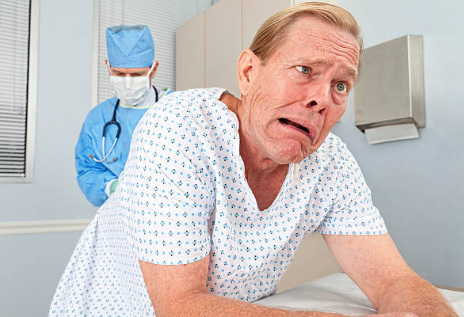Why Am I Peeing So Much All Of A Sudden?
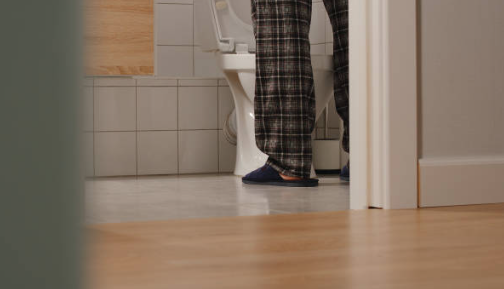
Why Am I Peeing So Much All Of A Sudden, And Why Do I Pee So Much At Night But Not During The Day?
Picture this: You’re finally drifting off into a peaceful sleep when a nagging sensation jolts you awake – the desperate urge to pee. It’s frustrating, it’s exhausting, and it’s messing with your quality of life. If you’re a man over 40, the chances are you’ve experienced this scenario far too often.
Why am i peeing so much all of a sudden?
The sudden onset of frequent urination, especially at night, can be concerning. It’s crucial to understand that getting up to pee a couple of times a night is usually considered normal as we age. However, if you find yourself making significantly more bathroom trips, it’s time to look into potential causes.
Common Culprits Behind Frequent Urination: Understanding the Causes for Men Over 40
If you’ve been asking yourself, “why am I peeing so much all of a sudden?“, you’re not alone. Frequent urination affects millions of men, especially as they age. Unravelling the reason behind your increased bathroom visits is the first step to finding much-needed relief.
Frequent urination at night male problem: Let’s delve into the most common reasons men over 40 experience frequent urination at night (and during the day)
-
Enlarged Prostate (Benign Prostatic Hyperplasia or BPH): This is one of the primary concerns for aging men. The prostate gland naturally grows as you get older. When it gets too large, it squeezes the urethra (the tube carrying urine out of your body). This obstruction leads to a weak urine flow, the feeling that your bladder isn’t entirely empty, and frequent daytime and nighttime bathroom trips.
-
Overactive Bladder (OAB): Imagine your bladder has a mind of its own! With OAB, the bladder muscles contract involuntarily, causing a sudden, urgent need to urinate, even if your bladder isn’t full. OAB symptoms can include leaking urine before making it to the bathroom and waking up multiple times at night to use the toilet.
-
Diabetes (Type 1 and Type 2): Uncontrolled blood sugar levels put your kidneys into overdrive. They work to filter out excess glucose, leading to increased urine production. If diabetes is the culprit, you might also notice excessive thirst and unexplained weight loss alongside frequent urination.
-
Urinary Tract Infections (UTIs): While less frequent than in women, men can still develop UTIs, leading to inflammation anywhere along the urinary tract (kidneys, ureters, bladder, urethra). Besides the constant urge to pee, UTI symptoms can include burning or pain during urination, cloudy or foul-smelling urine, and sometimes blood in the urine.
-
Medications: Be mindful of medications you’re taking. Diuretics, prescribed for high blood pressure, are designed to make you urinate more. Other types of medications can have increased urination as a side effect. If you have concerns, always discuss your medications with your doctor.
Additional Factors to Consider: What Else Might Be Causing Your Frequent Urination
While the primary culprits for frequent urination were covered earlier, it’s worth also considering these less common but still important factors, especially if you’ve ruled out the more typical causes:
-
Excessive Fluid Intake: The Simple Culprit Are you a big water drinker? While hydration is vital, chugging large amounts of fluid, especially close to bedtime, will inevitably lead to more frequent nighttime bathroom runs. Spreading your water intake more evenly throughout the day can help.
-
Caffeinated and Alcoholic Beverages: Diuretics in Disguise Coffee, tea, colas, energy drinks, and of course, alcohol, have a diuretic effect. Your kidneys work overtime to eliminate them from your system, leading to increased urine production and potentially disrupted sleep due to bathroom trips.
-
Sleep Apnea: More Than Just Snoring Sleep apnea isn’t only about snoring and gasping for breath. This sleep disorder can trigger the release of a hormone called atrial natriuretic peptide (ANP), which signals your kidneys to eliminate excess fluid, resulting in more frequent urination at night.
-
Neurological Conditions: Disrupted Signals Diseases that affect the nervous system, including Multiple Sclerosis (MS), Parkinson’s disease, spinal cord injuries, or a previous stroke, can sometimes interfere with the intricate signals between your bladder and brain. This mismatch can cause bladder dysfunction, including frequent or urgent urination.
-
Other Potential Causes:
- Anxiety and Stress: In some individuals, heightened anxiety can lead to bladder hypersensitivity and more frequent urination.
- Interstitial Cystitis: Also called painful bladder syndrome, this chronic condition causes bladder pain and discomfort alongside frequent urination.
- Bladder Cancer or Stones: While rare, these conditions might sometimes manifest with changes in urination patterns.
Important Note: If you’re concerned about the potential for neurological conditions, or your frequent urination is accompanied by other symptoms like pain, blood in the urine, fever, or significant changes in how your bladder functions, it’s crucial to see a doctor for a thorough evaluation.
Why Your Bathroom Runs Happen Mostly at Night: Unraveling Nocturia
The frustration of needing to pee repeatedly during the night when you barely have the problem during the day is a condition known as nocturia. Understanding what causes this nighttime annoyance can help you find strategies for relief and a better night’s rest.
Here’s a deeper look into why you might be experiencing the “why do I pee so much at night but not during the day” dilemma:
-
Fluid Habits: The Timing Matters If you’re pounding water or indulging in caffeinated and alcoholic beverages late in the evening, it’s no surprise your sleep is interrupted by bathroom visits. Your bladder fills up quickly, causing you to wake up throughout the night with the urge to go.
-
Heart Conditions: The Lying Down Effect Some heart conditions like congestive heart failure can cause fluid to build up in your legs (edema) throughout the day. When you lie down at night, gravity shifts this fluid back into your bloodstream. Your kidneys then work to process the extra fluid, leading to increased urine production and those frustrating nighttime trips to the bathroom.
-
Sleep Apnea: More Than Just Snoring Sleep apnea causes pauses in your breathing during sleep. These interruptions can trigger hormonal changes that increase your body’s production of urine at night. If you have other symptoms of sleep apnea like loud snoring, daytime fatigue, or gasping for air during sleep, it’s worth discussing this possibility with your doctor.
Additional Factors That Worsen Nighttime Urination
- Prostate Problems: An enlarged prostate, especially common in older men, can make it harder to empty your bladder fully during the day, leading to more frequent nighttime urination.
- Medications: Certain medications like diuretics, and some heart and blood pressure medicines, can increase your overall urine production, including at night.
- Lowered Bladder Capacity: As you age, your bladder may not be able to hold as much urine as it used to. Additionally, some medical conditions can reduce your bladder’s functional capacity, leading to more frequent trips to the bathroom throughout the day and night.
Important Note: If your nighttime urination is seriously disrupting your sleep or is accompanied by other concerning symptoms, don’t ignore it. Schedule a consultation with your doctor to rule out any underlying medical conditions that could be contributing to the problem.
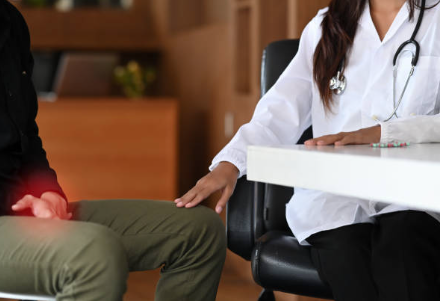
Stop the Nighttime Bathroom Runs: How to stop frequent urination at night
The good news is that you can find relief from frequent urination at night male. Let’s explore some strategies:
-
Lifestyle Changes:
- Reduce fluids close to bedtime.
- Limit caffeine and alcohol, which are diuretics.
- Elevate your legs in the afternoon to prevent fluid buildup.
-
Bladder Training: Gradually increase the time between bathroom visits and try “double voiding” (urinating twice in a row).
-
Medication Review: Talk to your doctor about any medications you’re taking that might be exacerbating the issue.
-
Prostate Support: If an enlarged prostate is the culprit, your doctor might recommend medications or minimally invasive procedures.
Unlocking Natural Relief: Strategies for Managing Frequent Urination at Night Naturally
Many men, understandably, want to try natural approaches first for managing their nighttime bathroom breaks. While these solutions aren’t a substitute for discussing any underlying conditions with your doctor, they can sometimes offer helpful relief.
Let’s delve into some popular natural remedies targeting the challenge of how to stop frequent urination at night naturally:
How to stop frequent urination at night using Herbal Remedies:
Saw Palmetto: This plant extract has long been used for prostate health. Research suggests it may help reduce symptoms of an enlarged prostate, including decreased urinary flow and frequent nighttime urination.
-
Pygeum Africanum: Derived from the African plum tree’s bark, this herb is another option for supporting prostate health and potentially improving urinary symptoms.
-
Other Potentially Helpful Herbs: Limited studies suggest herbs like stinging nettle and pumpkin seed extract might also offer benefits for urinary health when used consistently. Talk to your doctor or a knowledgeable herbalist for guidance.
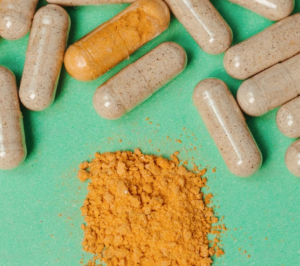
Prostate Health Supplements
Beyond individual herbs, consider these important nutrients for prostate support:
-
Zinc: Essential for prostate function. A deficiency can contribute to prostate enlargement. Look for supplements including zinc alongside other prostate-supportive herbs and vitamins.
-
Selenium: This trace mineral acts as an antioxidant and may help protect prostate health.
-
Other Vitamins and Minerals: Vitamins D, E, and B-complex vitamins can also play a role in supporting overall urinary and prostate health.
Lifestyle Modifications and Practices for your Prostate Health:
-
Pelvic Floor Exercises (Kegels): Strengthening the muscles that support your bladder and urethra can improve bladder control and reduce the urge to urinate frequently.
-
Bladder Training: Scheduling bathroom breaks and gradually lengthening the time between them can retrain your bladder to hold more urine.
-
Diet Changes: Limit spicy foods, acidic foods, and artificial sweeteners, all of which can irritate the bladder.
Additional Tips for a Better Night’s Sleep
-
Mindful Fluid Management: Limit your liquid intake in the hours before bedtime. Avoid caffeine and alcohol, particularly in the evening, as they can worsen frequent urination.
-
Consider Supplements like Magnesium Hydroxide: Some smaller studies suggest that magnesium hydroxide supplements may help manage nocturia. Always discuss the use of any supplements with your doctor.
Important Notes about Natural Prostate Supplements:
-
Choose High-Quality Supplements: Opt for reputable brands that offer standardized extracts and clear dosage information.
-
Patience is Key: Natural remedies often take time to show their full effects. Be consistent with your chosen approaches for at least a few weeks to a month before evaluating their effectiveness.
-
Consult Your Doctor: While natural options can be safe for most men, it’s always crucial to discuss them with your doctor, especially if you take other medications or have underlying health conditions.
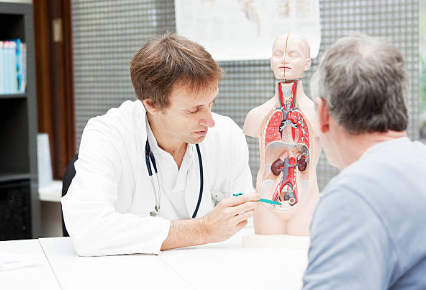
FAQs: Your Frequent Urination Questions Answered
FAQ-1: Why do I suddenly need to pee so much more than usual?
ANSWER: A sudden increase in urination, especially at night, could signal a few things. Enlarged prostate (BPH), overactive bladder, infections, uncontrolled diabetes, medication side effects, or simply excessive fluid intake are all possible culprits. It’s best to see your doctor to pinpoint the exact cause.
FAQ-2: I pee a lot at night, but not much during the day – why?
ANSWER: This pattern points to a few possibilities:
- Fluid Habits: Drinking heavily before bed fills your bladder quickly.
- Heart Conditions: Fluid buildup in your legs during the day can shift when you lie down, causing your kidneys to process more urine at night.
- Sleep Apnea: This sleep disorder can affect hormone levels and lead to increased nighttime urination.
FAQ-3: Can prostate problems cause frequent urination?
ANSWER: Yes! An enlarged prostate (BPH) is a major contributor to frequent urination in older men. The enlarged gland presses against the urethra, affecting bladder emptying and leading to increased bathroom visits.
FAQ-4: What natural remedies can help with frequent nighttime urination?
ANSWER: Several natural approaches show promise for managing frequent urination at night:
- Herbs: Saw palmetto, Pygeum Africanum, and others support prostate health.
- Supplements: Zinc, selenium, and other nutrients are crucial for prostate function.
- Pelvic Floor Exercises: Strengthening these muscles improves bladder control.
FAQ-5: Are there medications that can help with frequent urination at night male?
ANSWER: Yes. Depending on the cause of your frequent urination, your doctor might recommend:
- Medications to shrink an enlarged prostate
- Medications to relax overactive bladder muscles
- Treatments for any underlying conditions like sleep apnea or diabetes.
SEE ALSO: Latest Prostate Supplements >>
NOTE :
The information provided in this article and the rest of this website is intended for general knowledge and informational purposes only, and does not constitute medical advice. It is essential to consult a qualified healthcare professional for the diagnosis and treatment of any health condition. Never disregard professional medical advice or delay in seeking it because of something you have read in this article.

